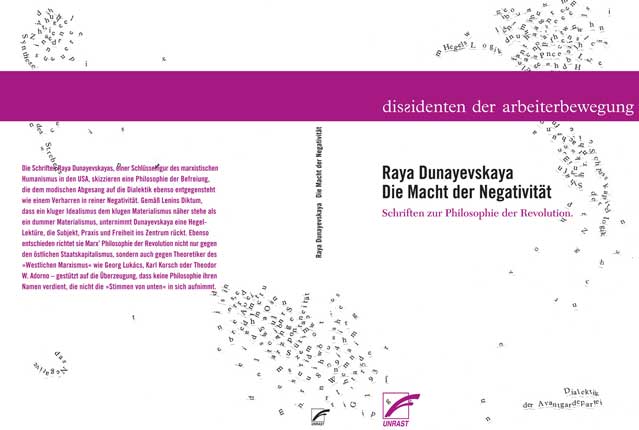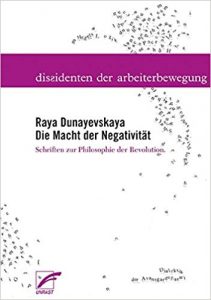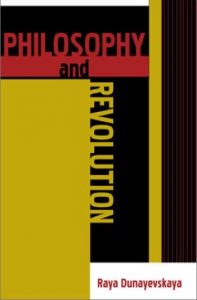Introduction: Raya Dunayevskaya’s Concept of Dialectic, by Peter Hudis and Kevin B. Anderson
Part I. The Philosophic Moment of Marxist-Humanism
Ch. 1. Presentation on the Dialectics of Organization and Philosophy (June 1, 1987) — The Philosophic Point — Dialectics of Organization — Conclusion: Untrodden Paths in Organization –
Ch. 2. Letters on Hegel’s Absolutes of May 12 and 20, 1953 — Letter on Hegel’s Science of Logic (May 12, 1953) — Letter on Hegel’s Philosophy of Mind (May 20, 1953)
Part II. Studies in Hegelian and Marxian Dialectics, 1956-63
Ch. 3. Notes on Hegel’s Phenomenology
Ch. 4. Rough Notes on Hegel’s Science of Logic — Volume I: Objective Logic — Volume II: Subjective Logic or the Doctrine of the Notion
Ch. 5. Notes on the Smaller Logic from the Encyclopedia of the Philosophical Sciences — Chapter Two – Preliminary Notion — Chapter Three – First Attitude of Thought Toward the Objective World — Chapter Four – Second Attitude of Thought Toward the Objective World — Chapter Five – Third Attitude of Thought Toward the Objective World — Chapter Six – The Proximate Notion of Logic with its Subdivision — Chapter Seven – First Subdivision of Logic – The Doctrine of Being — Chapter Eight – Second Subdivision of Logic – The Doctrine of Essence — Chapter Nine – Third Subdivision of Logic – The Doctrine of the Notion
Ch. 6. Dialogue on the Dialectic — Letter on Marxism and Freedom, from 1776 until Today (May 18, 1956) — Letter to Herbert Marcuse (July 15, 1958) — Letter to Herbert Marcuse (October 16, 1960) — Letter to Herbert Marcuse (January 12, 1961) — Letter to Charles Denby (March 10, 1960) — Letter to Jonathan Spence (June 1, 1961) — Letter to Erich Fromm (November 11, 1963)
Part III. Theory and Practice at a Turning Point, 1964-71
Ch. 7. Letter of October 27, 1964, to Herbert Marcuse
Ch. 8. Hegel’s Dialectic and the Freedom Struggles of the 1960s — Lecture in Japan on Hegel — Presentation of Black/Red Conference — Logic as Stages of Freedom, Stages of Freedom as Logic, or the Needed American Revolution
Ch. 9. Toward Philosophy and Revolution, from Hegel to Sartre and from Marx to Mao — Letter on Hegel’s Theory of Tragedy (November 17, 1968) — Letter on Draft of Chapter 1 of Philosophy and Revolution (October 13, 1968) — The Newness of our Philosophic-Historic Contribution
Part IV. After Philosophy and Revolution: Hegel’s Absolutes and Marx’s Humanism, 1972-81
Ch. 10. Hegel’s Absolute as New Beginning
Ch. 11. Hegel, Marx, Lenin, Fanon, and the Dialectics of Liberation Today
Ch. 12. On Lukacs’ Marxism — Letter on Lukacs (December 14, 1972) — Lukacs’ Philosophic Dimension
Ch. 13. The Hegel-Marx Relation Revisited — Letter to Harry McShane — On the 150th Anniversary of Hegel’s Death: How Valid for our Day Are Marx’s Hegelian Roots?
Part V. The Changed World and the Need for Philosophic New Beginnings, 1982-87
Ch. 14. Marxist-Humanism and the Battle of Ideas — On the Battle of Ideas: Philosophic-Theoretic Points of Departure as Political Tendencies Respond to the Objective Situation — Letter on Karl Korsch (1983) — Marxist-Humanism: The Summation That Is a New Beginning, Subjectively and Objectively (1983)
Ch. 15. Forces of Revolt as Reason, Philosophy as Force of Revolt — Not by Practice Alone: The Movement from Theory — Letter to the Youth on the Needed Total Uprooting of the Old and the Creation of New Human Relations — Dialectics of Revolution and of Women’s Liberation — The Power of Abstraction
Ch. 16. Another Look at Hegel’s Phenomenology of Mind — Letter on Hegel’s Phenomenology of Mind (June 26, 1986) — Introduction to “Why Hegel’s Phenomenology? Why Now?”
Ch. 17. Reconsidering the Dialectic: Critiquing Lenin … and the Dialectics of Philosophy and Organization — Letter to Louis Dupré — Letter to George Armstrong Kelly — Talking to Myself — On Political Divides and Philosophic New Beginnings
Appendix: Excerpts from 1949-51 Philosophic Correspondence with C. L. R. James and Grace Lee Boggs









